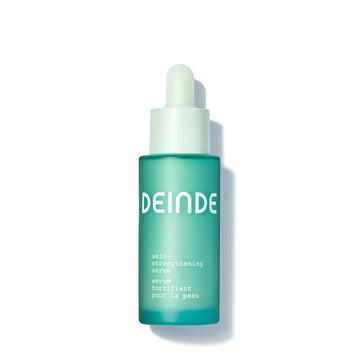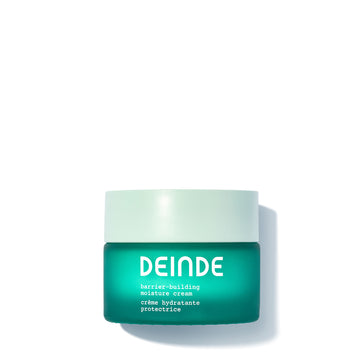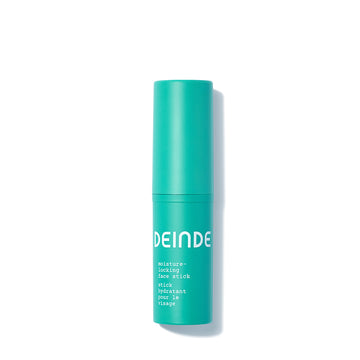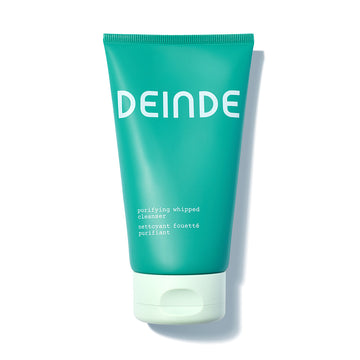
Your Sensitive Skin Routine
We completely understand that being sensitive is in now, but can we leave it to our feelings and not our skin?
If you’re in the camp of sensitive skin, you’re among 60-70% of women and 50-60% of men who report experiencing some levels of sensitive skin. Struggle with acne? You’re actually 2.5x more likely to have sensitive skin.
Symptoms like itching, burning, stinging, tightness, or dryness are common reactions that may occur in response to stimuli that generally shouldn’t evoke such a strong reaction.
Dealing with skin more prone to irritation might feel like an impossible task sometimes, but we’re here to help you deal with skin that needs a little more attention.
Why Does Sensitive Skin Happen?
There’s no one factor that triggers sensitive skin. Chemicals, temperature highs and lows, skincare, hair products, and fragrances can all be culprits. Studies have found decreased lipids in sensitive skin. Lipids, like ceramides, are key in maintaining the structure of your epidermis, the outermost layer of your skin. They’re critical to skin barrier health, providing protection from environmental factors and ensuring the water that belongs in your body stays in your body.
This decrease in lipids was associated with a decline in barrier function for those with sensitive skin. Since your skin is your first line of defense against potential irritants, a weakened skin barrier is likely to let through potential irritants.
What Are the Main Signs of Sensitive Skin?
Trying to figure out if you have sensitive skin? Here are some of the most common signs to look for:
- Dehydrated Skin: Lipids help protect your skin from transepidermal water loss (TEWL), or maintaining water within our bodies. If your skin barrier is damaged, you’d have an increase of TEWL, leading to dehydrated skin. Dry skin can make fine lines and wrinkles appear more prominent, or produce small, flaky dry patches.
- Persistent Redness: Irritating products can cause a heightened immune response, so your skin may appear red and angry.
- Visible Blood Vessels: Blood vessels grow as a response to triggers, allowing immune cells to pass through more effectively.
- Sun Sensitivity: We’re talking more than your standard sunburn. You might experience redness, rapid sunburn, or exacerbation of conditions like eczema or rosacea.
Is it an Allergy or a Skin Sensitivity?
An allergic reaction on your skin can appear as a rash, often in the form of hives, eczema flare-ups, or contact dermatitis. Eczema appears as especially dry, itchy skin, while hives take the form of bumps or welts that turn white when pressure is applied. Contact dermatitis may look like a rash, blisters, or bumps. Some allergic reactions occur only when the skin is exposed to sunlight—just one more reason it’s important to always apply sunscreen.
If you’re unsure if your reaction or skin concern is an allergic reaction or just sensitive skin, it’s always best to consult a dermatologist for an expert assessment and solution.
What Is a Good Sensitive Skin Routine?
Whether you’re looking to refresh your skincare routine, or are new to the sensitive skin journey, we’ll help you figure out what to look for. You’ll want to skip the hydroxy acids and scented products. Ingredients like salicylic can be too harsh on sensitive skin, while fragrances have also been found to irritate skin.
- Cleanse: Remove dirt and pollution with a gentle, sulfate-free cleanser. Bonus points: A pH-balanced cleanser can preserve the skin barrier and help it stay hydrated. Look for a pH between 5 and 5.5.
Our purifying whipped cleanser was made with all skin types in mind, whether you have sensitive skin, oily skin, or combination skin. It’s pH-friendly and formulated to remove impurities and dirt without sacrificing your skin barrier.
Made with a biotech active, fermented vegetable-based glycolipids, it gently cleanses while supporting the microbiome. It’s also formulated with allantoin, found to be one of the top active ingredients for sensitive skin. Allantoin softens, soothes, and hydrates skin
It’s also certified by both the National Eczema Association and SkinSAFE, so you can lather in peace. Looks like a cloud, so your skin can feel like one.
- Toner: Not all toners are created equal. Look for one with soothing ingredients like chamomile or green tea and hydrating like hyaluronic acid. Make sure to avoid any alcohol based toners as they’ll further dry out your skin.
- Serum: Opt for a serum to put in some extra work. Vitamin C can help protect skin from environmental damage, while squalane, a lipid, is moisturizing and soothing.
- Moisturizer: Similar to your toner, pick a nourishing moisturizer with humectants to preserve hydration. You’ll want a formula with hyaluronic acid, glycerin, or ceramides. Apply your moisturizer when your skin is a bit wet for more effective hydration. Another option is to use an oil like jojoba. As a 97% match for human sebum, jojoba can support balance in your natural oil production without clogging pores.
- Sunscreen (AM): Protect your skin barrier from further sun damage and dehydration with a solid SPF. Dermatologists recommend a mineral-based sunscreen; one that contains titanium dioxide, zinc oxide, or both, for sensitive skin.
Mineral sunscreens work by reflecting the sun’s UV rays, versus absorbing them like a chemical sunscreen does. They may leave a white cast but chemical sunscreens are more likely to irritate and sting sensitive skin. You’ll want to use SPF 30 or above, and don’t forget to reapply about every 2 hours, especially if you’re spending time outside.
- Exfoliation: Sensitive skin doesn’t mean you have to skip exfoliating. Enzyme exfoliants, which come from fruit like papaya, pineapple, and pumpkin are usually lighter than hydroxy acids. Just like a chemical or physical exfoliator, they work to remove dead skin cells and soften skin. Limit your exfoliation to between 1-2 times a week.
If you have sensitive skin, it’s always a good idea to patch test a new product on your arm or neck. This way, you can identify any potential negative reactions before working your new skincare product into your routine.
What Should You Know About Makeup for Sensitive Skin?
Even if your skincare routine is full of green flags, if you wear makeup, you should give your products a second look.
Mineral makeup (there’s a theme here) contains natural ingredients like zinc oxide, iron oxide, and titanium, and may be less bothersome to sensitive skin. Using products with limited ingredients, no preservatives, and no alcohol or scents, can also lead you in the right direction.
The best option is to look for the same certifications you’ll find on DEINDE products: the National Eczema Association’s Seal of Acceptance or the SkinSafe certification. SkinSafe products are rigorously tested to be hypoallergenic and allergy-free, so you can shop worry-free.
Have makeup that’s been sitting around for a while? We know it can be hard to part with—what if that one palette in the back of your drawer goes viral again? But old and expired makeup isn’t just less effective, it can harbor germs, leading to irritation and infection. Just like the yogurt in your fridge, make sure to check for and stick to cosmetic expiration dates.
Does Diet Affect Skin Sensitivity?
Our diets play a major role in maintaining skin health and gut microbiome balance. So much so, this relationship even has a name: the gut-skin axis. A deregulated gut microbiome has been observed in a number of inflammatory skin conditions like rosacea and psoriasis.
-
Alcohol & Fats: Alcohol and high-fat diets can worsen skin inflammation, while low-fat diets can reduce gut bacteria diversity.
- Protein: Proteins like egg whites, fish, and chicken are high in collagen peptides, which can benefit the aging process. Including whey and pea protein in your diet can decrease infection-causing bacteria while the presence of beneficial bacteria in your gut increases
Fish is also the best food source of omega-3, a hydrating essential fatty acid. Put Herring, mackerel, and salmon on the menu, or flaxseed, edamame, or even canola oil for a plant-based diet.
- Fiber: Whole grains, especially the ones rich in dietary fiber, can also boost the number of good bacteria in your gut. Brown rice, unsweetened cereal, and even popcorn are all fiber-packed options.
Take It Easy
Long story short, if you have sensitive skin, you’re not alone. In fact, you’re in good company, with over half of the population sharing in your experience. Beyond your personal care products, sensitive skin can be affected by climate, stress, genetics, and honestly simply aging.
With sensitive skin, it’s important to select gentle products that won’t irritate your skin further. Make sure your skincare and makeup routine is fragrance-free, alcohol-free, and free of hydroxy acids. When in doubt, check the packaging for specific certifications by SkinSafe or the National Eczema Association. If you’re using a new product, make sure to do a patch test before committing.
Skin can be nourished from the inside out, too. Eating a diverse diet, with plenty of fiber, protein, and omega-3s can greatly impact your gut microbiome, and in turn, your skin health.
Ultimately, pay attention to what your body and skin is telling you. If it’s unhappy, you’ll know. Take the time to find the products that work best for you and your skin needs—you won’t regret it.
Sources:
When it comes to skin health, does diet make a difference? | AAD
Does sensitive skin represent a skin condition or manifestations of other disorders? | PMC.
Sensitive Skin: Symptoms, Common Triggers & How It's Treated | Houston Methodist
Contact Dermatitis | Mayo Clinic








